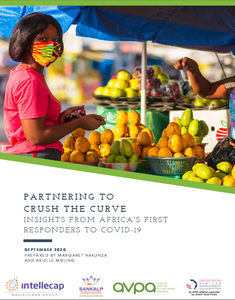Partnering to Crush the Curve: Insights from Africa’s First Responders

It is no secret that the Covid-19 pandemic hi t us like a tsunami , unawares and unprepared. As the pandemic continues to overwhelm countries around the globe, it has transformed the way we live, work and even interact within our communities.
Africa was one of the last continents in the world to contract the virus, and watched the rest of the world battle the pandemic, knowing it would eventually hit and knowing that the impact would be devastating.
To begin with, most countries in Africa have precious healthcare systems in place and the vast major i ty of people have no access to health insurance. For instance, 4 out of 5 people in Kenya lack health insurance.
[ 1 ] Africa witnessed first-world countries with advanced health care systems, hospitals, and equipment get quickly over run and overwhelmed by the virus. If they couldn’t handle Covid-19, how on earth would Africa manage this disease?
Furthermore, Africa’s informal economy makes up approximately 41% of its GDP.
[2] The very nature of this informal economy has no cushioning – for those who are informal workers, not working means not getting paid. And not getting paid means you can’t feed your family for every day you can’t work. An economic slowdown in Africa means that a vast majority of people will no longer be able to feed their families on a daily basis. Stay-at-home mandates for many low-income day laborers in Africa means they will be starving. Most people would run the risk of exposure to Covid-19 by working, rather than starve because they can’t generate an income staying at home.
To address these issues, various organizations have been taking urgent actions to assist the families living in these communities, but most organizations are still testing the waters to see what works and what doesn’t . Some are adapting already existing measures to better suit the crisis, but all are piloting and pivoting as they go. With most African countries facing similar challenges, from poor and ill equipped healthcare systems to over run informal settlements and congested public transport , there is a great opportunity for these initiatives to learn from each other ,within and across borders, to lessen Covid-19’s impact on the continent .
We launched this series to facilitate learning, highlight successful examples, and promote collaboration across the African continent . The approaches for dealing with Covid-19 in Africa will – and should – look distinctly different from other parts of the World. There is no silver bullet , but we hope these learnings and insights will help not only shorten learning curves for dealing with Covid-19, but ultimately, rebuild our ecosystems to be stronger and more resilient in the future.




